One Way Out
One Way Out
Most successful groups usually have one dominant member (maybe two) who provides the artistic vision the rest can respect and rally around. The Allman Brothers Band was largely Duane’s conception, and it was his unflagging energy and incredible guitar playing that drove them to mesmerizing heights as they blended rock, jazz, blues and country in new and exciting ways. Unfortunately, the guitarist was killed in a motorcycle accident in October of ’71 just as the band was achieving large-scale commercial recognition.
One way Out
With slide guitar genius Duane Allman at the helm, the Brothers started out strong and sure. They went from strength-to-strength in the late Sixties and early Seventies, becoming one of the world’s truly inspired improvising bands as evidenced by their landmark 1971 live recording at the Fillmore East of New York City. In the concert The Allman Brothers Band have been playing (a.o.) 'One Way Out'. A live recording was included on their 1972 album "Eat a Peach." This was indeed recorded at the Fillmore East, but unlike the March 1971 live material used on the rest of "Eat a Peach" and "At Fillmore East," 'One Way Out' was recorded at the venue's final show on June 27, 1971.
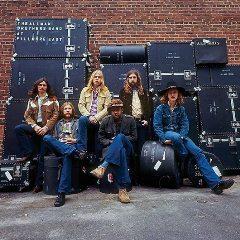
Allman Brothers Band - At Fillmore East (1971)
Still a mystery who wrote 'One Way Out'. As with many blues songs, the history of "One Way Out" falls into murk. On the Allman Brothers releases, 'One Way Out' is credited to Marshall Sehorn and Elmore James. Sehorn was a musician who became southern promotion man for the Fire and Fury labels. He put his name on Elmore's recording.
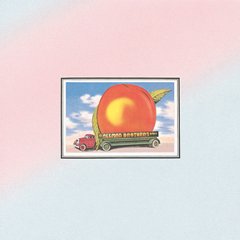
Allman Brothers Band - Eat a Peach (1972)
Common practice then…and theft. Sehorn would eventually receive songwriting credit (and the royalty payments) for over 350 songs recorded in the 1960s. He went on to form a company with Allen Toussaint, helping the the Neville Brothers obtain a recording contract and recording numerous New Orleans legendary musicians. As this story is aimed at blues listeners…he also claimed writing credits with Lighntin' Hopkins. Here is Sehorn, a fellow who LOOKS like an adulterer who might skulk out a second floor window, but not really a bluesman. He didn't write it.
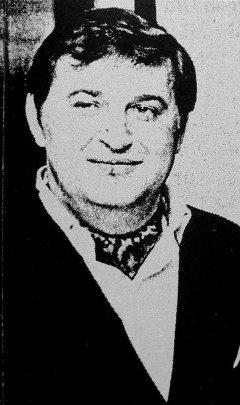
Marshall Sehorn
It seems 'One Way Out' to have been originally recorded by Elmore James at Beltone Studios in New York City in late 1960 or early 1961. A radio repairman by trade, Elmore James was known to have rewired his amplifiers to get a distorted sound, years before distortion became a key element of rock and roll. It features a full band arrangement with a four-piece horn section providing some counterweight to his sliding guitar lines and half-screamed vocals. James appears not to have released it at that time.
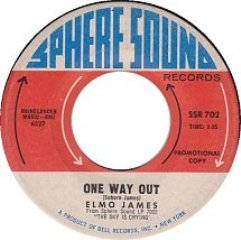
Elmore James - One Way Out (1965)
Instead, Sonny Boy Williamson II reworked and recorded it for Chess Records in Chicago in September 1961, releasing it shortly thereafter. He would then return and re-record a different working of it in September 1964, again for Chess in Chicago, this time with Buddy Guy on guitar and Lafayette Leake on piano. The two efforts were substantially different, with one dominated by harmonica playing while the second version is faster and features a more prominent guitar riff as well as the having the band drop out when Sonny Boy sings “Might be your man . . I don’t know”. These elements will show up in the Allman Brothers version.
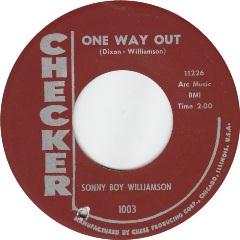
Sonny Boy Williamson II - One Way Out (1962)
Subsequently, the initial Elmore James version of "One Way Out" was posthumously released in 1965, using it as the B-side of his single "My Bleeding Heart" for Sphere Sound Records. But by now, the song was associated with Sonny Boy not him.
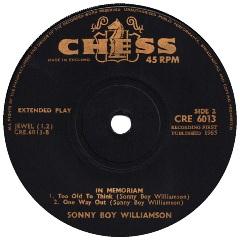
Sonny Boy Williamson II - One Way Out (1965)
In mid-1965, bluesman G.L. Crockett, from Carrollton, Mississippi, released yet another reworking of the song, now called "It's a Man Down There". It featured a slower tempo, a softer blues vocal line apparently styled after Jimmy Reed. "It's a Man Down There" became a big hit in R&B circles, reaching number 10 on the Billboard Hot Rhythm & Blues Singles chart, and qualified the otherwise obscure Crockett for one-hit wonder status. Songwriting credits on this reworking appear to have been given to Crockett and one Jack Daniels. The Crockett track was included on the Time-Life album "Living the Blues: 1965-69," part of the "Living the Blues" series. Indeed, so much was the vocal style like Reed, that Reed himself then recorded an answer song later that year, entitled "I'm the Man Down There", which became a small hit.
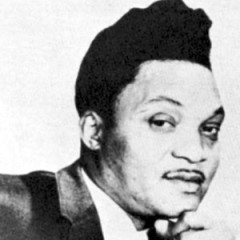
G.L. Crockett
Returning to the original title, in this punchy, dynamic performance, the Allmans demonstrated their abilities in the blues-rock roadhouse style. The live recording has all the elements that made them unique: the relentless beat of two drummers, the intertwining guitars of Dickey Betts and Duane Allman and Gregg Allman’s gruff vocals.
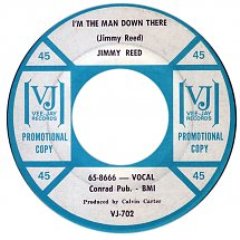
Jimmy Reed - I'm the Man Down There (1965)
Guitarist Dickey Betts starts with a variation of the Sonny Boy Williamson riff (second version). He is then joined by the rest of the band with Duane Allman’s slide guitar riff on top of Dickey’s part. It’s interesting to note while Dickey’s guitar riff changes with the tune’s chord progression, Duane’s part does not, providing shifting harmony to the main riff as the tune progresses. Also note the change in the rhythm section from the tight riff under the vocal verses to the more open ended feel during the guitar solos. After Betts’ guitar solo, Duane Allman and Betts trade guitar licks over just the drums before the full band re-enters going into Duane Allman’s slide solo.
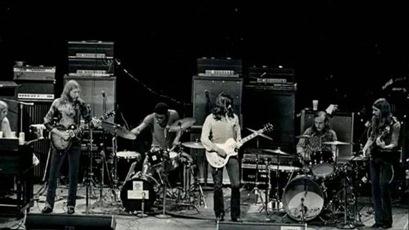
The Allman Brothers Band at Fillmore East, NYC 1971
The Allman Brothers Band were one of those groups whose music infiltrated the musical landscape. Unfortunately, the band got wrapped up in the deleterious side effects of rock and roll early on, and the damage started to show just as the band finally achieved success. In 1970, Twiggs Lydon, on the road with the band, stabbed and killed a promoter at a bar. Duane and three other band/crew members checked themselves into rehab in 1971. Duane died in a motorcycle crash in 1971, just weeks after the release of At Fillmore East. Bassist Berry Oakley died in 1972, also on a motorcycle, three blocks from Duane’s accident.
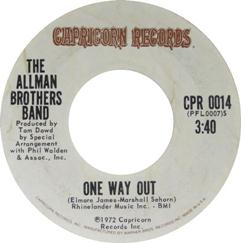
Allman Brothers Band - One Way Out (1972)
One Way Out, The Allman Brothers Band lyrics
Ain't but one way out baby, Lord I just can't go out the door. Ain't but one way out baby, and Lord I just can't go out the door. Cause there's a man down there, might be your man I don't know. Lord you got me trapped woman, up on the second floor; If I get by this time I won't be trapped no more. So raise your window baby, and I can ease out soft and slow. And lord, your neighbors, no they won't be Talking that stuff that they don't know. Lord, I'm foolish to be here in the first place, I know some man gonna walk in and take my place. Ain't no way in the world, I'm going out that front door Cause there's a man down there, might be your man I don't know. Cause there's a man down there, might be your man I don't know. Cause there's a man down there, Lord, it just might happen to be your man... Lord, it just a might be your man, Mmm-mm-mmm-mm... Lord, it just a might be your man, Oh baby, I just don't know...
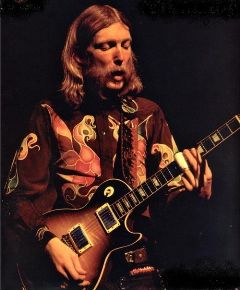
Duane Allman
The Allman Brothers Band - One Way Out - At Fillmore East 1971
Last Updated (Monday, 24 June 2019 20:32)








